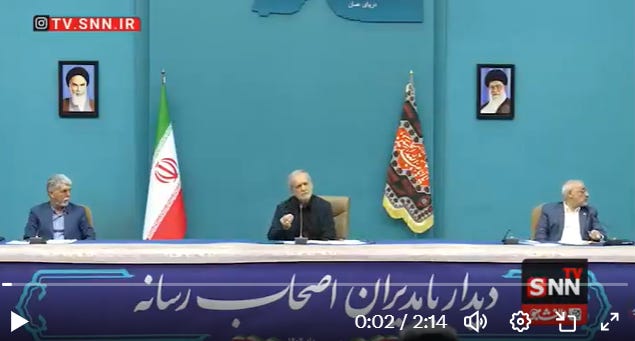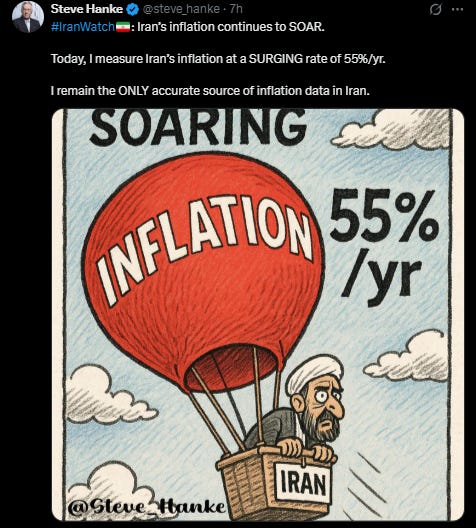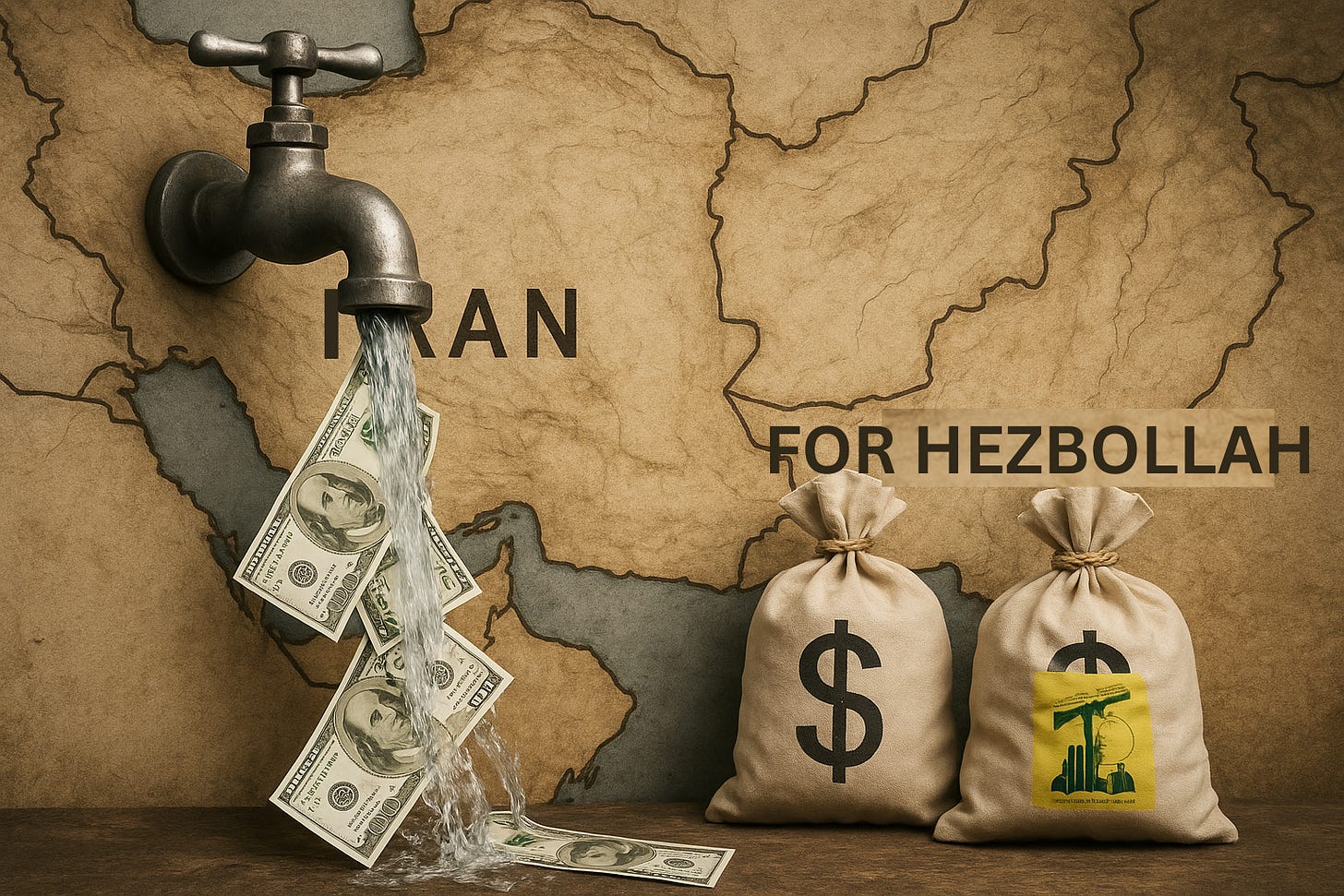Iran Cries Crisis While Allegedly Bankrolling Hezbollah's Lebanese Takeover
Tehran faces water emergency and currency collapse while reportedly continuing to transfer weapons and funds to the Lebanon-based terrorist group
As Iran's President Masoud Pezeshkian warns that Tehran could run out of water by September, emerging reports suggest the Islamic Republic continues to prioritize funding armed terrorist proxies over addressing its mounting domestic crises. The contradiction between Iran's economic desperation at home and its persistent regional interventions has become increasingly stark as the country grapples with simultaneous water, energy, and currency emergencies.
Iran on the Brink of Environmental and Economic Collapse
Iran's environmental crisis has reached critical levels, with President Pezeshkian delivering an unprecedented warning in July about the country's water situation. "In Tehran, if we cannot manage and people do not cooperate in controlling consumption, there won't be any water in dams by September or October," the president stated, marking the first time a sitting Iranian leader has acknowledged such an imminent timeline for water depletion in the capital.
The crisis extends far beyond Tehran. Iran has endured five consecutive years of drought, with the country's Meteorological Organization recording a 40% drop in rainfall over the past four months compared to long-term averages. From 2003-2019, Iran lost nearly 211 billion cubic meters of water—almost twice its renewable supply at current levels—due to inefficient agricultural practices and systematic mismanagement according to scientific analysis. A 2006 report from the office of the governor of Isfahan additionally states that at least 6.5 million cubic meters of water were diverted to a secret “nuclear center.”
The environmental collapse has triggered widespread infrastructure failures. Over 20 provinces have experienced power shutdowns due to the interconnected water and energy crisis, as reported by Iranian authorities. Citizens across the country have taken to the streets in water protests, from Khuzestan to Isfahan, with demonstrations recently erupting in towns including Nasimshahr, Sabzevar, and Khomam.

Currency Crisis Forces Denomination Overhaul
Iran's economic situation has deteriorated to the point where parliament moved in August to remove four zeros from the national currency, the rial. The measure, approved by the economic commission, aims to address a currency that has lost over 90% of its value since 2018.
The Iranian rial has plummeted to record lows, with inflation hovering above 35% and reaching 38.7% in May 2025 according to official data. The International Monetary Fund projects Iran's nominal gross domestic product will plunge by $60 billion in 2025, reaching $341 billion—its lowest level in years.
In addition to current economic constraints, new sanctions imposed by the Trump administration in 2025 have further restricted Iran's oil revenues, with the new financial measures described as the largest sanctions package against Iran since 2018.

Regional Operations Continue Despite Domestic Crisis
While Iran faces unprecedented domestic challenges, intelligence reports suggest the regime continues its regional proxy operations. According to Saudi news outlet Al-Hadath, Iran has reportedly sent messages to Hezbollah regarding its commitment to sending increased funding and weapons transfers to Lebanon through third countries. The goal is to enable Hezbollah to control of all parts of the country and establishing a new coalition in Lebanon where Hezbollah is the sovereign, effectively replacing the current government in Lebanon.
This reported commitment to increased funding of the terrorist organization comes as Lebanese authorities move toward implementing an unprecedented disarmament plan for Hezbollah. The Lebanese government approved in August the objectives of a US proposal requiring Hezbollah's complete disarmament by December 31, 2025.
Lebanon's Historic Disarmament Challenge
The Lebanese government's decision represents the most significant challenge to Hezbollah's armed status since the group's formation. Under the US-backed plan, implementation would occur in four phases, with the Lebanese Army required to submit a detailed disarmament plan by the end of August 2025, with full disarmament implemented by the end of 2025.
However, Hezbollah ministers and their Shiite allies walked out of the cabinet meeting in protest, as seen below, with the group declaring it would treat the disarmament decision "as if it did not exist." The organization called the move a "grave sin" and vowed to maintain its armed capabilities regardless of government decisions.
The tensions have spilled into Lebanon's streets, with hundreds of Hezbollah supporters taking to Beirut's southern suburbs in protests against the disarmament plan. Additional demonstrations occurred in multiple Lebanese cities, highlighting the domestic opposition to any forced disarmament of the Iranian-backed group.
Iran’s Response to Hezbollah’s Disarmament
In response to Hezbollah's demilitarization in Lebanon, confrontational rhetoric came from Ali Akbar Velayati, international affairs adviser to Supreme Leader Ali Khamenei. "The Islamic Republic of Iran is certainly opposed to the disarmament of Hezbollah," and "Iran has always supported the people and the resistance of Lebanon and continues to do so”, Velayati declared to the Tasnim news agency.
Velayati went further, characterizing the Lebanese government's disarmament plan as foreign manipulation. "Just as previous anti-Lebanese plans failed, this one will also not succeed, and the resistance will stand firm against these conspiracies," he stated, describing the effort as a "US-Israeli plot."
Lebanese Government Rejects Iranian 'Guardianship'
Lebanese officials responded with unprecedented directness to Iranian interference, marking a significant shift in diplomatic tone. The Lebanese Ministry of Foreign Affairs issued a strongly-worded statement condemning Velayati's remarks as "flagrant and unacceptable interference in Lebanon's internal affairs."
"Some senior Iranian officials have repeatedly overstepped by making unwarranted statements regarding Lebanese domestic decisions that are of no concern to the Islamic republic," the ministry declared. In a particularly pointed rebuke, Lebanese officials reminded "the leadership in Tehran that Iran would be better served by focusing on the issues of its own people."



